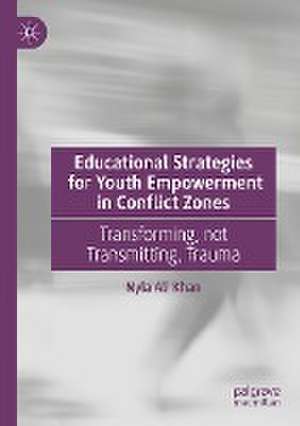Educational Strategies for Youth Empowerment in Conflict Zones: Transforming, not Transmitting, Trauma
Autor Nyla Ali Khanen Limba Engleză Paperback – 4 feb 2022
| Toate formatele și edițiile | Preț | Express |
|---|---|---|
| Paperback (1) | 776.72 lei 6-8 săpt. | |
| Springer International Publishing – 4 feb 2022 | 776.72 lei 6-8 săpt. | |
| Hardback (1) | 781.77 lei 6-8 săpt. | |
| Springer International Publishing – 4 feb 2021 | 781.77 lei 6-8 săpt. |
Preț: 776.72 lei
Preț vechi: 947.22 lei
-18% Nou
Puncte Express: 1165
Preț estimativ în valută:
148.62€ • 154.87$ • 123.06£
148.62€ • 154.87$ • 123.06£
Carte tipărită la comandă
Livrare economică 03-17 aprilie
Preluare comenzi: 021 569.72.76
Specificații
ISBN-13: 9783030662288
ISBN-10: 3030662284
Ilustrații: XXXVI, 203 p. 3 illus.
Dimensiuni: 148 x 210 mm
Greutate: 0.29 kg
Ediția:1st ed. 2021
Editura: Springer International Publishing
Colecția Palgrave Macmillan
Locul publicării:Cham, Switzerland
ISBN-10: 3030662284
Ilustrații: XXXVI, 203 p. 3 illus.
Dimensiuni: 148 x 210 mm
Greutate: 0.29 kg
Ediția:1st ed. 2021
Editura: Springer International Publishing
Colecția Palgrave Macmillan
Locul publicării:Cham, Switzerland
Cuprins
1.- Chapter one: Introduction. 2.- Chapter Two:Determining the Separation Between Perpetrator and Victim: Importance of Intergenerational Family Communication.- 3. Chapter Three: In the Arena of Textbook Wars, Education Can Be Deployed to Build Common Ground Between Opposing Forces. 4.- Chapter Four: Empowering Pedagogy: Dialogue and Building Common Ground---Part 1. 5.- Chapter Five: Education Conscientizes About Social and Political Conditions. 6. - Chapter Six: Participatory Educational Methodology; Healing of Memories; Logotherapy. 7.- Chapter Seven: Finding Purpose and Meaning in the Sturm and Drang of the Unredressed Agonies of the Past, 8.- Chapter Eight: Conclusion.- Appendix I, Appendix II, Bibliography, Index.
Notă biografică
Nyla Ali Khan is a US-based academic, former Visiting Professor at the University of Oklahoma, and former Associate Professor at the University of Nebraska at Kearney, USA. She has taught courses on Postcolonial Literature and Theory, World Literature, Women’s and Gender Studies, and Women and Islam.
Textul de pe ultima copertă
This book offers fresh and exciting new directions of inquiry into the highly contentious issue of conflict resolution in South Asia. By shifting its gaze from a politics of division mired in ethno-nationalisms into a healing and restorative focus, the author moves the dialogue forward into the realm of community, healing, and shared governance. The book analyzes the major constitutional and political missteps that have led to the current situation of violence and distrust in countries such as India and Pakistan, keeping the focus on Jammu and Kashmir. This monograph will appeal to a wide range of audiences including academics, researchers, graduate students interested in South Asian politics, development, trauma studies, and peace and conflict studies.
Nyla Ali Khan is Professor at Rose State College, former Visiting Professor at the University of Oklahoma, USA, and former Associate Professor at the University of Nebraska at Kearney, USA. She has taught courses on Postcolonial Literature and Theory, World Literature, Women’s and Gender Studies, and Women and Islam.
Caracteristici
Offers fresh and exciting new directions on conflict resolution in South Asia Analyzes the major constitutional and political missteps in India, Pakistan Reviews local communities, cultural, and non-governmental agencies in the peace-building process
